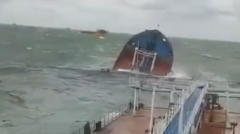In the Kerch Strait, which separates Russia from Crimea, two Russian tankers ran aground after drifting. Disturbing footage shows one vessel split in half, with visible oil streaks on the water's surface. At least one crew member was killed in the incident. A rescue operation was launched for 13 crew members, but has been interrupted due to severe weather. The remaining crew members aboard the second tanker are reported to have essential life support elements but face an uncertain wait for rescue. President Putin has mobilized a group to investigate the incident, which involves a potential criminal negligence inquiry. Analysts have indicated that the tankers, owned by Volgatanker, were smaller vessels designed for domestic waterways. The ongoing situation highlights the vulnerabilities of oil transport in the region, especially following heavy sanctions on Russian oil exports since the invasion of Ukraine.
Russian Oil Tankers Wrecked in Black Sea Amid Ongoing Tensions

Russian Oil Tankers Wrecked in Black Sea Amid Ongoing Tensions
Two oil tankers owned by a Russian company have suffered significant damage in the Black Sea, resulting in an oil spill and raising concerns of negligence.
The incident underscores broader issues of oil transport safety in politically fraught areas, with expert observers noting that such maritime accidents are not uncommon in these waters.
In 2007, the Volgoneft-139 suffered a similar fate in the same vicinity, shedding light on the historical risk of tankers in the Kerch Strait. Additionally, as global sanctions against Russian oil remain in force, the need for reliable shipping logistics becomes increasingly critical for the Russian economy.
As authorities continue to assess the situation and search for solutions, the fate of the two tankers remains uncertain, potentially igniting further scrutiny of Russia's oil transportation practices.
In 2007, the Volgoneft-139 suffered a similar fate in the same vicinity, shedding light on the historical risk of tankers in the Kerch Strait. Additionally, as global sanctions against Russian oil remain in force, the need for reliable shipping logistics becomes increasingly critical for the Russian economy.
As authorities continue to assess the situation and search for solutions, the fate of the two tankers remains uncertain, potentially igniting further scrutiny of Russia's oil transportation practices.




















